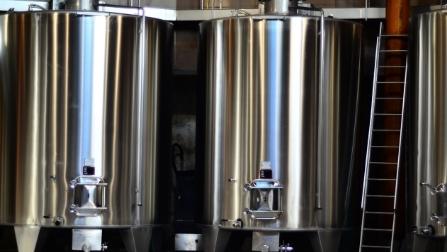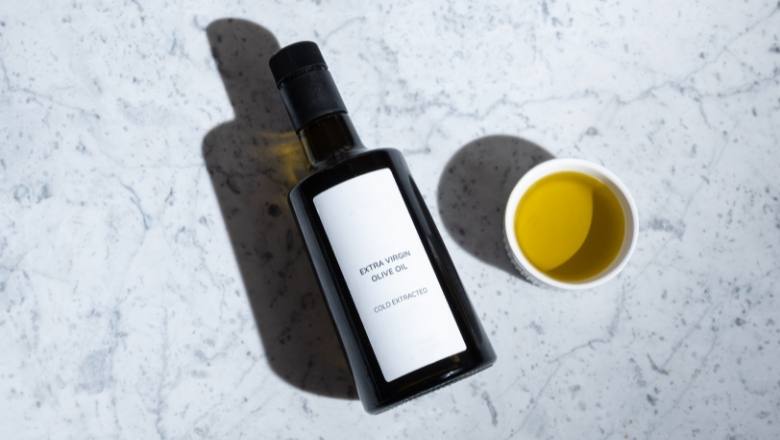Best Types of Containers For Storing Olive Oil – THE GUIDE
Olive Knowledge is a part of Amazon Associates. As an Amazon Associate, we earn from qualifying purchases. Read our Affiliate Disclosure to learn more.

If you want to keep your olive oil fresh as long as possible, one of the most important things is storing it properly. In this post, I’ll show you the three best containers for storing olive oil, but also the ones you should avoid.
The best types of containers and bottles for storing olive oil are:
- Inox containers – best to store large amounts of olive oil
- Dark glass bottles – best to use in the kitchen
- Ceramic bottles – best bottles with customized designs
Best Container For Storing Large Amounts of Olive Oil

There’s only one type of container that’s suitable for storing large amounts of olive oil, and that’s INOX. Inox is undoubtedly the no.1 container you should always use to store plenty of olive oil, which is especially important for olive growers and oil makers.
Inox is a type of steel that’s completely inert to olive oil and gives the oil adequate protection from oxygen, sunlight, and temperature.
Inox provides the possibility of hermetic sealing of olive oil so it doesn’t come in contact with fresh air. Faucets on Inox containers are placed at the bottom, so no fresh air comes in when you’re pouring oil from Inox into smaller bottles or containers.
In the past, people would use stone containers (in Croatia, we call them “kamenica “) to store olive oil. That’s one of the worst types of olive oil containers and isn’t used anymore. Today, stone containers are only used as souvenirs.
3 Best Containers/Bottles For Storing Smaller Amounts of Olive Oil
Now that you know what type of container is best for storing large amounts of olive oil, we can go to the next (and probably the more important) section, which is storing smaller amounts of olive oil. This category applies to all of us since we mostly use smaller amounts in our kitchen, and knowing the proper way of storing the oil is beneficial if you want to keep the oil fresh and healthy for an extended time.
Related: How To Store Olive Oil After Opening? Keep It Fresh
1. Dark Glass Bottles

Dark glass bottles are the most common way of storing smaller amounts of olive oil, and almost all the markets sell olive oil stored inside glass bottles.
Glass is a material that’s also inert with olive oil, which means that the oil won’t cause the glass to release any chemicals into it, damaging the properties of olive oil.
When it comes to the color of glass bottles, I see many people making mistakes. The glass bottle should always be as dark as possible (mostly it’s deep green) to keep the sunlight away from the olive oil. Many people use transparent bottles, which aren’t good because they let the light inside.
In my opinion, dark glass bottles are the way to go for most of you since they’re incredibly cheap, easy to get, and you actually get them when buying olive oil from most shops. If you don’t use plenty of olive oil on a daily basis, 0.5 liters (17 ounces) bottles are the best.
2. Ceramic Bottles
Ceramic bottles aren’t so popular among people, especially when we talk about storing olive oil. However, ceramic is an excellent material for olive oil storage. It doesn’t affect the smell, taste, and nutritional properties of olive oil, which makes it suitable for storing.
What makes ceramic bottles interesting is that you can buy just one bottle and use it for many years. Whenever you purchase new olive oil or have large amounts stored in Inox containers, just pour it into the ceramic bottle, and you’re ready to use olive oil in your kitchen.
Another great thing is that there are plenty of customized ceramic bottles out there (with different designs) so that you can choose the one you like the most. If you own a restaurant or just want to have a fancy kitchen – that’s a way to go. I suggest you check customized ceramic bottles on Etsy – one of the largest online shops.
However, don’t forget to wash ceramic bottles before pouring a new olive oil inside.
3. Inox Bottles
I already told you that Inox is undoubtedly the best way to store large amounts of olive oil (check above). It’s the same when storing smaller amounts of olive oil for personal use in the kitchen. So, I don’t need to repeat all the inox properties and benefits.
The problem with Inox bottles is that they’re not so easy to find and buy. You’ll easily buy a large inox container, but few markets sell them in small sizes.

Luckily, I have found some exciting and modern Inox bottles online. The one I like the most is the Olietta Stainless Steel Bottle . It also has a dispenser, so it’s effortless to pour olive oil into salads, pans, and wherever else you need it (it’s the one in the image above).
Container Materials To Avoid
Now that you know which materials are great for olive oil storage, I quickly want to discuss containers that you should avoid.
When storing olive oil, avoid these types of containers:
- PVC containers – you should avoid using PVC containers. However, many markets sell olive oil inside PVC bottles and containers, which is terrible. Olive oils’ nutrients have the properties to dissolve some of the polymers in PVC bottles. These polymers affect the taste, smell, and health benefits of olive oil, and olive oil won’t stay fresh for a long time. PVC will also expose the oil to oxygen, which will make it rancid in the long run. The reason why many people still use it is the price. PVC containers are incredibly cheap, and they add a little extra cost for olive oil makers out there. My advice is only to use PVC containers to transport olive oil, but make sure to pour it into suitable containers as soon as possible.
- Iron containers – even though not many people use them, I want you to know that iron is terrible for storing olive oil because it will affect the oils’ nutritional properties.
- Copper containers are the same thing as iron containers. Copper containers are extremely bad for olive oil. Not many people use them, too (lucky us), but please teach them a lesson if you see someone using it.
Why It’s Important To Choose The Right Material of Container
Long story short – heat, light, oxygen, and container material affect the quality of olive oil. If the oil is exposed to any of these, it may lose some fantastic benefits. Luckily, by choosing a suitable material for containers and bottles, you can prevent that from happening.
By using proper containers, you’ll:
- Prevent unnecessary exposure to oxygen
- Prevent the oil from the heat
- Prevent sunlight from affecting the oil
- Prevent oil exposure to harmful chemicals (PVC, iron, copper, etc.)
So many preventions, hehe. Okay, those were the negative factors that affected the olive oil quality. Now, I want to show you some olive oil properties that will be protected by using the correct type of containers.
When using the proper containers, olive oil will:
- Stay fresh for an extended time (prevent oxidation).
- Keep the smell nice and taste delicious.
- It’ll keep many healthy properties.
- Oils’ natural nutrients will stay intact.
- Oil will keep polyphenols and other antioxidants that are extremely important for our health.
- Chlorophyll will remain intact – which makes the oil beautifully green.
I hope that you understand the importance of olive oil containers that are used for storing oil by now. I showed you the best types of containers to use when storing olive oil, and I hope you’ll start using them (if you haven’t already).
Remember that keeping the olive oil fresh and healthy is one of the most important things to get the most benefits, whether you use it in the kitchen, restaurant, or store large amounts of it.
Similar Articles:
